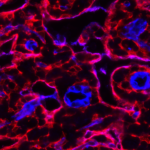Link to Pubmed [PMID] – 19567674
Cancer Res. 2009 Jul;69(14):5978-86
Increased expression of alpha(6)beta(4) integrin in several epithelial cancers promotes tumor progression; however, the mechanism underlying its transcriptional regulation remains unclear. Here, we show that depletion of homeodomain-interacting protein kinase 2 (HIPK2) activates beta(4) transcription that results in a strong increase of beta(4)-dependent mitogen-activated protein kinase and Akt phosphorylation, anchorage-independent growth, and invasion. In contrast, stabilization of HIPK2 represses beta(4) expression in wild-type p53 (wtp53)-expressing cells but not in p53-null cells or cells expressing mutant p53, indicating that HIPK2 requires a wtp53 to inhibit beta(4) transcription. Consistent with our in vitro findings, a strong correlation between beta(4) overexpression and HIPK2 inactivation by cytoplasmic relocalization was observed in wtp53-expressing human breast carcinomas. Under loss of function of HIPK2 or p53, the p53 family members TAp63 and TAp73 strongly activate beta(4) transcription. These data, by revealing that beta(4) expression is transcriptionally repressed in tumors by HIPK2 and p53 to impair beta(4)-dependent tumor progression, suggest that loss of p53 function favors the formation of coactivator complex with the TA members of the p53 family to allow beta(4) transcription.

